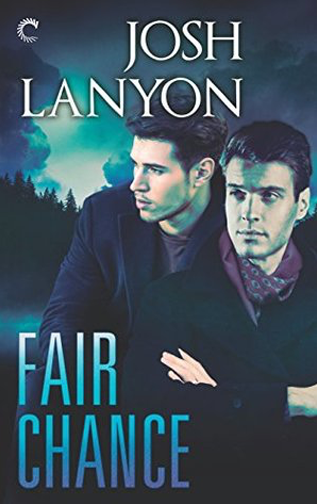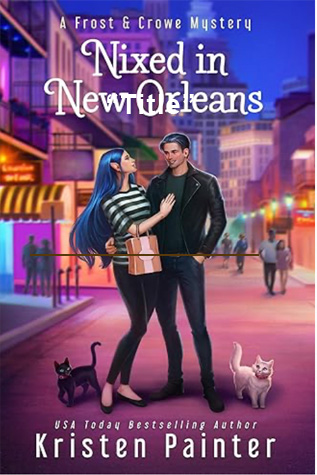I received this book for free from my own shelves in exchange for an honest review. This does not affect my opinion of the book or the content of my review.
Source: my own shelves
The Dark Farewell
by
Josh Lanyon
LGBT, paranormal fantasy, vintage mystery in a Kindle edition that was published by JustJoshin Publishing Inc. on January 1, 2010 and has 145 pages.
Explore it on Goodreads or Amazon
Other books by this author which I have reviewed include Fatal Shadows, Death of a Pirate King, A Dangerous Thing, The Hell You Say, Dark Tide, Somebody Killed His Editor, Fair Play, Fair Chance, "So This is Christmas", Murder at Pirate's Cove, Secret at Skull House, Footsteps in the Dark, Mystery at the Masquerade, “A Funny Thing Happened . . .”, Murder Takes the High Road, Fair Game, Corpse at Captain's Seat, Scandal at the Salty Dog, Body at Buccaneer's Bay, Lament at Loon Landing, Death at the Deep Dive, The Boy With The Painful Tattoo
A standalone story set in a rural county in Illinois in the Roaring Twenties and revolving around a New York newspaper man.
My Take
That takes you back. A year when the 19th amendment gave women the right to vote and the discovery of King Tut’s tomb in 1922. Another take-back is Mrs Hoyt’s views on women, the hussies, using cosmetics!
Lanyon made it hard for me to come down on the side of the strikers until much further into the story, and then forced me to remember that the news can be very one-sided. Sympathy in town is all on the side of the strikers, which only reinforces that one-sided aspect, although, then again . . .
”. . . the defense’s case as ‘These men were justified in what they did; and besides, they didn’t do it!’”
That’s something that always makes me crazy. Why do owners and the company bigwigs figure it’s okay for them to make tremendous amounts of money but niggle about their workers? How much money do they really need? Later Lanyon notes the conditions the miners were forced to work in . . . and ya can’t blame them for striking!
The gay aspect is almost a side note and made me so angry. What business is it of anyone else who someone wants to love? Jerks! More bigotry rears up due to Julian’s coloring — he must be some kind of colored. Oy.
It’s not that long after World War I and bits of that trauma leak over. David had been with Pershing’s American Expeditionary Forces.
It seems hypocritical of David to belittle Julian for being “a sissy”, a “pansy”. I couldn’t blame David for being ticked off at Julian at first. That guy was so forward! He’s also really ticked that Julian is conning people with his medium act. It’s almost a quarter of the way in to the story that we learn the truth about David. Poor guy. He does get to doing quite a bit of introspection in his character arc. It helps that Lanyon uses third person protagonist point-of-view from David’s perspective.
That Grand-père of Julian’s!! What a . . . I can’t even think of something bad enough to call him! The way he uses and abuses his grandson! Some of the negatives come through when Julian speaks of what his dreams are . . . and why they’ll never come true. As for “Grand-père’s take on epilepsy . . . I wanna kill him. I love that Dr Pearson is more realistic about it.
There’s a brief mention of the Ku Klux Klan being seen as lawbringers with David having a thought about it. I do wish Lanyon had delved more into this hate group. It’s a trouble brought about by Prohibition when bootleggers will sell to anyone.
I did crack up about those soft-drink parlors. The soda ingredients were, um, interesting, lol.
Oh, boy, Lanyon does make some good points about Lee’s career and his knowledge. Scary stuff, especially with Joan so vulnerable.
Lanyon paints an emotive picture of the time with its prejudices and culture — I swear I was sweating in the heat! As for Julian’s situation, yeah, I liked the ending, even if Lanyon did go for the trite deux ex machina.
The Story
It’s been a year since the Herrin Massacre and David wants to look back on it, reflect on it, on the aftermath of violence. It’s also a chance to see Amy, to grieve Gus.
There is more going on, though, then a long-meant visit, for a serial killer is rampaging through Illinois and Amy’s boarding house guests provide even more interest for the cynical Mr. Flynn.
The Characters
David Flynn is a newspaper man for The Atlantic Monthly from Greenwich Village in New York City looking to revisit a miner massacre. Paul, whom David had known at Brown, had been David’s friend, taken during the war.
Herrin, “Bloody” Williamsburg County, Illinois, is . . .
. . . the small town where Gus Gulling, David’s mentor at Brown University who had been a New York intellectual and radical who’d won a Pulitzer, had lived. Amy Gulling is his salt-of-the earth widow who now runs a boarding house. Mrs Greer helps out in the kitchen. Guests include the newly widowed (and obnoxious) Mrs Alicia (?) Hoyt (her son fell in the Battle of the Argonne and “won” a Medal of Honor) and her daughter, Joan; Dr Pearson; and, Mr Devereaux, who is interested in spiritualism, and his forward, illiterate grandson, Julian, who is a medium, a.k.a. the Magnificent Belloc. The Comte de Mirabeau is Julian’s spirit guide. (Julian’s parents had been Count Amadeus and Zaliki the Seer.) Casey Lee is a salesman for the Queen of Egypt Medical Supply Company; that man has a good bit of medical knowledge! (He’d been in the war too with the 5th Marine Regiment at Belleau Wood.)
Julian’s contacts included Mary, Joseph who had been married to Mable Gabbay, Orrin has a suggestion for Henrietta, Dolly wants Peter to remarry, Maggie’s brother Glenn, Angela’s Bill Doyle (William Robert Tucker) has a message for her, Madeline has a reminder for Arthur, Lieutenant Christopher Thompson had been reported missing in battle, Grand-mère Helen, Cyrus wants Maggie taking the old tonic, Patrick is pain-free, and Thomas’ dog has been located.
The Herrin News is the local paper. Tom McCarty is a mine hoisting engineer. Skeltcher’s Tavern is no longer a tavern but a soft drink parlor. Young Dr Anson in Carbondale is pleasant and knowledgable. Milo’s place is a pool hall. Earl is its Hungarian bartender. The Lafayette Hotel is one of the nicest in town. Mrs Muenster is someone’s next door neighbor. Sheriff McFadden is a bigot.
Little Egypt in Jackson County seems to be influencing the treatment of the victims who include Anna Spiegel, Maria Campanella, Millie Hesse, and the lingering Theresa Martin. The Dance and Dine Inn sounds like a lovely place.
The Herrin Massacre had been . . .
. . . a conflict between striking miners of the Lester Mine Company owned by that fool WJ Lester, a.k.a. Ole King Coal, and the actions of the Southern Illinois Coal Company. Harding hates unions. McDowell had been a mine boss. Hugh Willis had been the union president with a warning.
The Messenger is a spiritualist periodical in Boston. General Black Jack Pershing led his American Expeditionary Forces late into World War I. The Ludlow Massacre gets a mention. Edgar Cayce had been a clairvoyant in the early part of the twentieth century. Ellery Sedgwick is David’s editor at The Atlantic Monthly. Mrs Packard is Joan’s aunt and Mrs Hoyt’s sister.
The Cover and Title
The cover is dark, in keeping with the title, with its skull-like and glowing full moon in the upper left corner in the deep, deep blue night sky with its sprinkle of stars. A black crow perches on the silhouetted branch of a tree above a barely there gentle green hill. Spanning the top of the hill is the title in a gradient white with a thin line of pale blue. A fancy horizontal line in pale green separates title from author’s name, which is also in the pale green.
The title is too true on so many levels, for it is The Dark Farewell.















